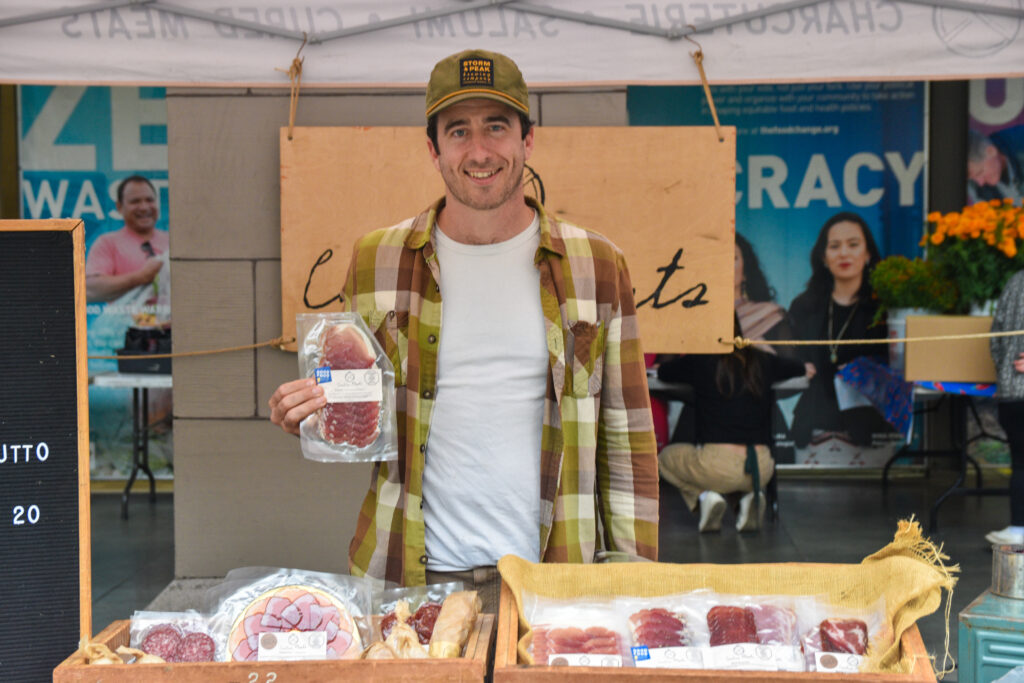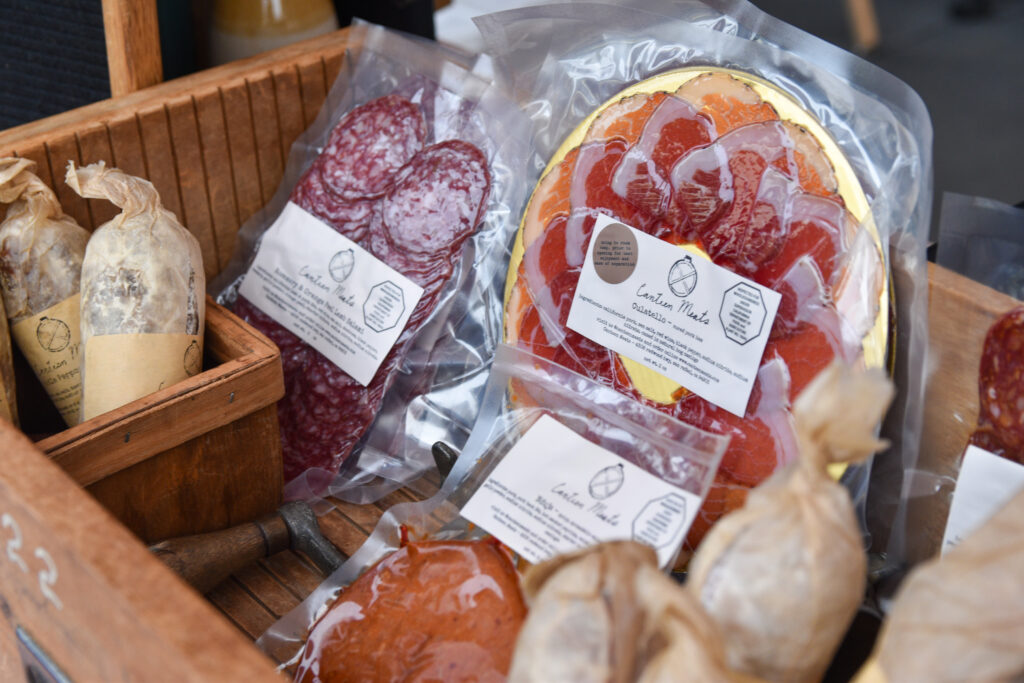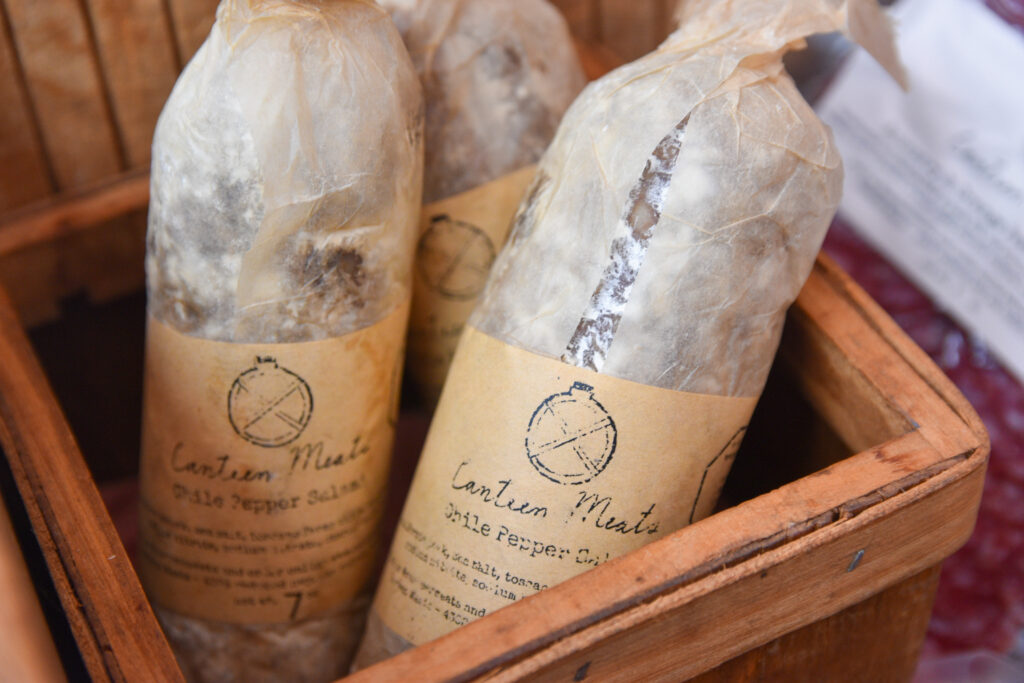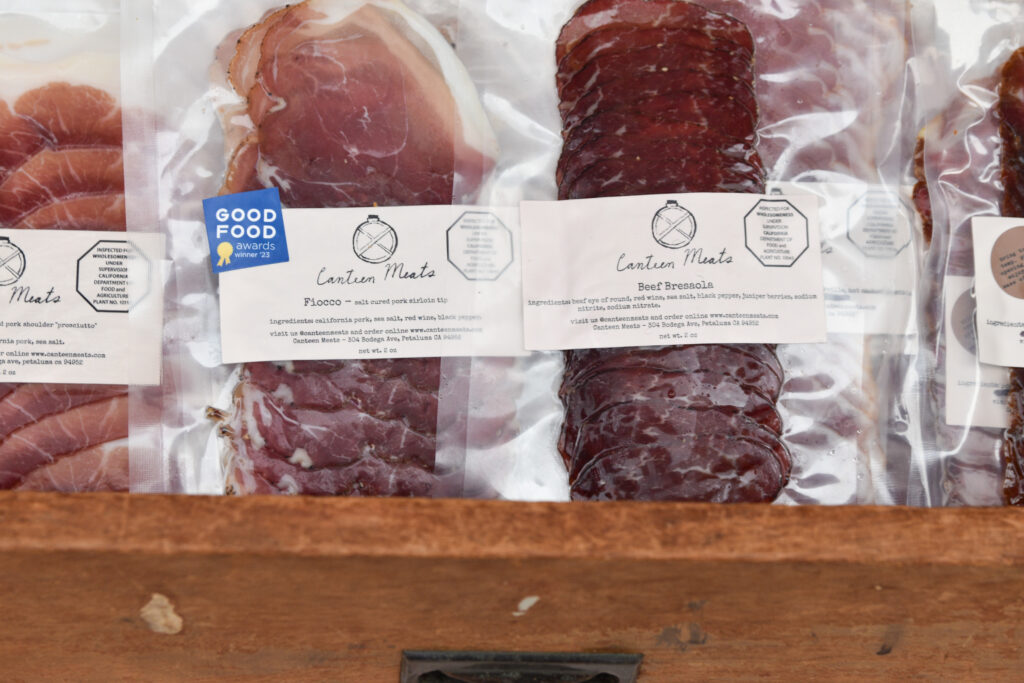Meet Petaluma’s Small Batch Butcher Shop That’s Slow-Curing Local, Sustainable Meats
Selina Knowles, Communications Coordinator
October 27, 2023

Cured meats have always been John Ginanni’s favorite food. “I have always liked the idea that you’re aging something, and that it gets better with time,” he says. At Canteen Meats, the business that John runs with his wife, Kaylyn Reyes, the salumi and charcuterie can take over a year to prepare. The two of them were inspired by their travels in Europe in 2016, where they volunteered and stayed at pig farms.
“We learned techniques, of course, but I’d say the biggest takeaway was just seeing how these farms aren’t giant companies,” says John. “These are real people, real families who just needed help.”
In 2020, the Bay Area natives put their experiences to use to start Canteen Meats in Petaluma, John curing meats and Kaylyn designing their brand, and they recently joined the Ferry Plaza Farmers Market. As they continue to grow, they remain committed to supporting local ranchers, while navigating the unique challenges of small-batch butchery and adapting to climate-impacted meat prices.

Sourcing from Climate-Wise Farms to Create Traditional Slow Food
“We have always bought from ranchers who sell at the farmers market with us, whether it’s pork, beef, lamb, duck,” John says. “It all starts with the raw product, so we try to align with people who are doing it right.”
They source most of their products from fourth-generation Stemple Creek Ranch in Tomales and Silver Sky Ranch in Petaluma. Both family farms prioritize biodiversity and the wellbeing of animals by raising grass-fed, free-ranging livestock on their certified organic pastures.
Canteen Meats also sources duck from Liberty Ducks, a favorite of many San Francisco restaurants. They were also early customers for Encina Farms’ specialty Iberico pork, from pigs that roam and forage in Oak forests.
“In most cases, the ranchers that we buy from are not even 10 miles away from where our shop is in Petaluma,” John says. “So if you’re talking about a low carbon footprint, it doesn’t get much lower than that.”
John supports his ranching neighbors whose practices support a healthy ecosystem, and he does his part by helping them make use of every part of the animal, even the often overlooked ones.
“Most ranchers have no problem selling a ribeye, for example, to somebody at the farmers market, but there are not a lot of people out there buying sides, the leg meat, or the round from ranches,” John explains. “So, we help them move a lot of that product that maybe home cooks wouldn’t use, but that we need for our production.”
After acquiring the raw meat and transporting it the short distance to Canteen Meats’ CDFA approved facility in Petaluma, the processing begins. Curing meats is an ancient practice, dating back to 3000 B.C., when it was necessary to preserve proteins for winter months when food was more scarce.
Techniques vary a bit across time and geography, but Canteen Meats uses a common salt curing technique where they encase the meat in salt to remove excess moisture. This also removes potentially harmful bacteria and extends its shelf life.

The Challenges of a Hyperlocal Operation
While the hyperlocal, small-batch model is what makes Canteen Meats so special, John also acknowledges that it brings some challenges. It can be tricky to maintain consistency across small batches, and the lengthy curing process can impact profitability.
At bigger butcher shops, like where John worked previously, it’s not uncommon to process large volumes, such as 2,000 pound batches of salami. John describes the process as formulaic, “You take 800 pounds of boneless sirloin and 200 pounds of back fat. Mix it in there, and you get salami.”
As a small business working in small batches, however, John says that “the hardest thing to get consistently right, across all the ranches and all the different breeds of pork, is the salami.” At Canteen Meats, they’re breaking down and working with a whole animal carcass. And he says, “It’s very different from animal to animal.”
The other major challenge is waiting on returns between purchasing the raw meat and finishing the often lengthy processing time. John says, “In some cases, you have to plan a full year and a half ahead. And in those particular cases, you’re not getting a return on your investment for that whole year and a half.”
Meanwhile, the price of meat is only going up. Recent years of drought have encouraged ranchers to sell their cattle. And while supply shrinks, prices grow, with some cuts spiking an 6.5% increase this past summer. Small ranchers at the Ferry Plaza Farmers Market have been feeling the financial burden of rising feed, fuel, and labor costs all year.
“All of that makes it more difficult to plan for the future, but you just keep on going,” says John. He finds reward in the farmers market community.

Building a Better Charcuterie Board at the Farmers Market
On Saturday mornings at Canteen Meats’ farmers market stand, you’ll find a scarlet array of salt-cured meats, salumi, and charcuterie. Choose from Duck Breast Prosciutto, salt-cured Coppa with black pepper and rose wine, spicy and spreadable ‘Nduja salami, and more.
To help you choose, John offers some guidance. “I’m always a fan of the salty and sweet,” he hints. He recommends their 2023 Good Food Award winning dry cured sirloin tip Fiocco with fresh figs or melon. (Dry fruits can supplement fruits that are out of season.) And for something lighter, he suggests a stone fruit salad with some sliced spicy coppa, fresh herbs, and stracciatella. (Insider tip: His booth is conveniently located next to Ramini Mozzarella, a local purveyor of buffalo mozzarella and stracciatella.)
Generally, having variety is a good way to go. “I always like to mix it up,” John says. To build a balanced snack board, try one type of salami, one tender beef product, and one fattier pork product.
At the end of the day, John is happy to be sharing his favorite foods at the farmers market. “What keeps me going is seeing people stoked when they buy something, come back the next week, and tell me how they made the best carbonara for their family and friends. You get to know a lot of your customers, and you always want to do right by them.”
Find Canteen Meats at the Ferry Plaza Farmers Market in the front plaza on Saturdays.
